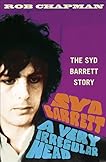The Pebble That Stood Alone

One muggy summer afternoon in 1988, I was at a stoner party - back in those days 6 or 7 unemployed small town teenagers sitting around, listening to albums and drinking 7up in a basement constituted a stoner party--when this kid in an Aerosmith shirt said, "Enough of this snake-charmer shit," then stood up from his seat and began filing through the stack of cassette tapes beside the stereo.
"Where's my Van Halen tape?" he grunted, "I'm outta here."
The music coming from the speakers that so repulsed Aerosmith was, without a doubt the scariest and most confusing sounds he had ever heard - but it had me totally floored. I had been indoctrinated to Syd Barrett some years earlier via the first two Pink Floyd albums plus the handful of Barrett-era Pink Floyd singles--all of which swept me off my feet. But now this was something beyond that. This was the first time I had ever heard Barrett's solo work and I couldn't have been more hypnotized if Barrett actually had been Baba Gulabgir and I was a Sir Lanka Naga Naja.
Apparently my Van Halen-loving aquaintance hadn't been innoculated by the early Pink Floyd vaccine like I had and therefore had no way of processing what he was hearing on Madcap Laughs. I on the other hand was instantly absorbed into the ether of Barrett's universe. Maybe it was the timing--maybe it was synchronicity. I used to think about my emotional/mental health in terms of it being like the American economy. In this context, late 1985 to early 1986 would have been my Great Depression, followed by another lesser depression in in late 1987 to mid 1988. In between that however, 1986-1987 was one of the happiest times in my life. When I first heard Barrett I was in the grip of this second lesser Depression. This lesser depression was less intense but lingered a bit longer than the first one. Not yet 20 years old, I was still in the midst of learning how to deal with adult emotions. Like many teens I used music to remedy what had ailed me. I medicated myself with heavy doses of Bob Dylan and John Lennon and Neil Young, Tim Hardin, Cat Stevens, Donovan, Lou Reed--all those serious cats. As great as this music was, as thought-provoking and uplifting or emotionally stirring as all of it was, they weren't able to get to me the same way that Barrett did. These artists all had the ability to seem as though they were singing directly to you, or directly for you. Barrett though, was something else. His music was as if it was actually coming directly from me. As if he had somehow teleported inside my head and flushed out all of the thoughts and melodies and visions that were hidden away in there. It was a listening sensation that I would very rarely ever experience again.
Gradually I ventured out of my second Depression, but I did so now armed with the woe-is-me sensative/misunderstood and tortured artist persona that Syd Barrett embodied in his solo work. It was a dark, haunted, menacing Modigliani/Luis Bunuel/Edgar Allan Poe persona that allowed little or no tolerance for anything other than my own self-absorbtion. To be blunt, I had become a total ass.
Gradually I ventured out of my second Depression, but I did so now armed with the woe-is-me sensative/misunderstood and tortured artist persona that Syd Barrett embodied in his solo work. It was a dark, haunted, menacing Modigliani/Luis Bunuel/Edgar Allan Poe persona that allowed little or no tolerance for anything other than my own self-absorbtion. To be blunt, I had become a total ass.
My self-absorbtion was so complete in fact that I actually realized that I had become a total ass because of it. Luckily I also realized I had to hide this fact from others. Which I did for the next decade or so...until I was able to mature beyond it somewhat. Which brings us to Syd Barrett: A Very Irregular Head by Rob Chapman.
 Chapman's book is easy to read for a Barrett fan, the research is adequate--the entire Syd Barrett story is there, starting in typical biography fashion with descriptions of Barrett's family lineage complete with thumbnail portraits of ancestors. The narrative then progresses chronologically from Syd's birth to his death and then ends with a chapter on his legacy. Mixed into the stew of course is ad naseum analysis and comparisons of everything that influenced Barrett from traditional British children's literature to cut-up methods of writing lyrics to the effect of light shows on his guitar playing* and so on and so on and blah, blah, blah. Chapman's biography also has a large amount of pop-psychology analysis of Syd not only by the subjects of Chapman's interviews, but by Chapman himself.
Chapman's book is easy to read for a Barrett fan, the research is adequate--the entire Syd Barrett story is there, starting in typical biography fashion with descriptions of Barrett's family lineage complete with thumbnail portraits of ancestors. The narrative then progresses chronologically from Syd's birth to his death and then ends with a chapter on his legacy. Mixed into the stew of course is ad naseum analysis and comparisons of everything that influenced Barrett from traditional British children's literature to cut-up methods of writing lyrics to the effect of light shows on his guitar playing* and so on and so on and blah, blah, blah. Chapman's biography also has a large amount of pop-psychology analysis of Syd not only by the subjects of Chapman's interviews, but by Chapman himself.
The central issue of any Barrett biography or dicussion is the fact that for a very brief period (of just a few years really) Barrett created one of the most fascinating bodies of work that the Rock world has ever known--and then, he simply stopped. By the age of 24 his entire recording career is through. "What the fuck happened?" is one of the great rock mysteries of all-time. Some say he went crazy, others say he created a persona of craziness to escape the pop spotlight. Others say he started out being eccentric because it was fun, but then he enjoyed it so much that he actually became that way. Some say that his imagination was so great and fascinating that he prefered living in the world of his imagination as opposed to the world of reality.
Although I was never a great recording artist myself and never lost my marbles to the degree that Barrett supposedly had, I had teetertottered my way through the 1990s going from periods of being extroverted and social to periods of being withdrawn and not wanting to be around other people at all. From all accounts Barrett was a very social person up until he obtained pop stardom. From which point he became withdrawn in varying degrees until his later years when he seemed content to simply read, tend to his garden, ride his bicycle to the pub, shop for groceries once or twice a week, and create paintings that he would imediately burn after capturing them in photograph.
 To be honest, his later years seem to be a pretty idyllic lifestyle to me, except for one huge omission: Love. Although Barrett had a number of girlfriends as a youth and was even engaged once, he never actually got married or had any children. Chapman's book offers almost no insight on this, however there are a few anecdotes that illustrate how well Barrett got along with children. There is also an emphasis on a teenage love affair Syd had. Then there are also a few examples of how Syd sabotagued his various relationships, including an episode where Syd became upset at his own engagement party, went into a room by himself and shaved his head before returning to the party. Hilarious! Yet psychotic.
To be honest, his later years seem to be a pretty idyllic lifestyle to me, except for one huge omission: Love. Although Barrett had a number of girlfriends as a youth and was even engaged once, he never actually got married or had any children. Chapman's book offers almost no insight on this, however there are a few anecdotes that illustrate how well Barrett got along with children. There is also an emphasis on a teenage love affair Syd had. Then there are also a few examples of how Syd sabotagued his various relationships, including an episode where Syd became upset at his own engagement party, went into a room by himself and shaved his head before returning to the party. Hilarious! Yet psychotic.Maybe Syd just never wanted to ever get married and have a family. Maybe if had gotten married it would only have ended in disaster. Who knows? But what I do know is that in my story, falling in love, getting married and having children worked wonders for me. Eventhough I ended up divorced by 2010, the experience knocked me out of my self-absorbed deep-thinker, tortured poet/artist persona faster than any drug ever could. Today, I will occassionally slip a Syd Barrett tune into the mix of songs that I listen to with my 5 year old son and 3 year old daughter. They seem to like them.
 *The influence of Barrett's guitar playing for instance can be heard in punk, art rock, grunge and Indie rock. As the leader of the Pink Floyd, the genius of Syd's guitar playing was that he used his guitar more as an effect generator instead of simply a device for playing chords and solos. He experimented with the sonic possibilities of distortion, dissonance and feedback--one of his most famous techniques was sliding his Zippo lighter up and down the fretboard of his Fender Esquire that was manipulated through an ancient echo box. This created the mysterious, spaced out noise that became a trademark of Pink Floyd's early sound.
*The influence of Barrett's guitar playing for instance can be heard in punk, art rock, grunge and Indie rock. As the leader of the Pink Floyd, the genius of Syd's guitar playing was that he used his guitar more as an effect generator instead of simply a device for playing chords and solos. He experimented with the sonic possibilities of distortion, dissonance and feedback--one of his most famous techniques was sliding his Zippo lighter up and down the fretboard of his Fender Esquire that was manipulated through an ancient echo box. This created the mysterious, spaced out noise that became a trademark of Pink Floyd's early sound. View all my reviews
©2010 Rockism 101. All Rights Reserved


louis vuitton outlet stores
ReplyDeletepandora charms outlet
polo ralph lauren
ralph lauren outlet
gucci handbags
ray ban eyeglasses
coach factory outlet
discount ray ban sunglasses
ray ban outlet
ugg australia
2016.12.21xukaimin